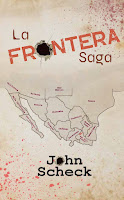Purchase La Frontera Saga , by John Scheck.
Attention Netflix, or Amazon Prime, or Hulu:
Here's your next hit series. La Frontera Saga's simple, yet insanely
relevant premise could be the stuff of legend, and maybe even affect
real change in a violent world where terror and murder and anarchy reign
supreme--in this case the Mexican drug trade.
Diego is a cool,
urbane, and yet bold Spaniard raised in the egalitarian Spanish society
where violent crime is relatively non-existent, where there's little
violence despite having the largest illicit drug trade in Europe because
of its many beach resort towns to which millions of Europeans flock in
search of fun, sun, and nightlife decadence where drugs are consumed so
profligately. Spain's social-democratic economy has leveled the playing
field enough that abject poverty is rare, as it is typically in abjectly
poor places where violent crime springs. Despite the fact Spain's drug
trade is extensive, there's little or no violence attached to it.
Diego
hustles in Benidorm, one of Spain's hottest coastal resort towns,
selling drugs and also providing luxury accommodations for those who can
afford such things. In the course of his hustles he befriends
vacationing (or exiled) Mexican narcotraficantes, one of whom is the
most powerful drug lord in all Mexico as the head of the Sinaloa cartel,
who sends his family to Benidorm for vacation and even manages to
abscond himself to the city for some down time.
Diego befriends
this man enough to posit a bold and brilliant plan on how to
revolutionize the Mexican drug trade by both reducing the insane volume
of murder and mayhem and also "spread the wealth" to the impoverished
millions in Mexico, social-democratic style, using the vast wealth of
the cartels acting as the government agent in leveling the playing
field.
There's much more to La Frontera Saga than this. Although
it has high-minded idealism at its core, it never presents this message
sanctimoniously, nor does it dilute the entertainment value of the
story. There's plenty of superbly drawn-up characters and plot lines to
keep the reader obsessed with finishing every page with great gusto.
What
makes the novel work is that Scheck's high-minded idealism is a truly
realistic adventure as told throughout the story. It never falls into
the tired old tropes about the Mexican drug trade, nor does it present
the same dark and cynical view that "nothing ever changes," that if you
live in Europe long enough, you realize that its egalitarian,
social-democratic cultures (Denmark, France, Germany, Spain, et al.) all
sprung, slowly and with great pain, from the abject lowest of low. For
instance, Spain created this amazing culture after emerging from years
of fascist rule that made it one of the poorest countries in Europe;
today it isn't perfect in Spain, but her people live well, safe and
prosperous, and with little signs of the massive wealth divide seen in
Mexico, and certainly without the insane violence and unbridled
criminality in that country.
My point being, it is entirely
possible to affect change. European social democracies sprung from first
unequal societies dominated by royals, then in some cases fascists and
other failed forms of self-governance and bad economic policies, and
anyone living in these countries today can clearly see how far they've
come the last 70 years. Why not do the same in Mexico? Someone just has
to have the visionary ideas and boldness to make it happen, then to
convince the people it is in their best interest to be more altruistic
and cooperative. That is Diego Valverde. And he's thinking big to
transform Mexico.
I read this book so fast, and with such
enthusiasm, that I lost an entire Saturday finishing it in one long read
where I only paused to eat--and, you know, answer nature's calling.
Other than that I read it constantly from end to end. Now how do I get
people at Netflix, Hulu, et al. to get onboard? We have the next hit
series.
- Goodreads review from Mr. Cool
.jpg)




